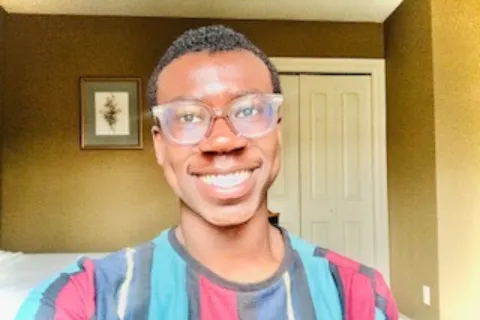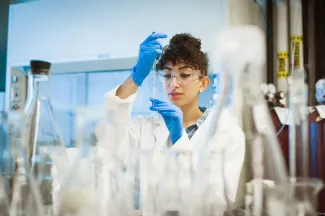“Pursue a passion where you can see real-world benefits and find the most value in your life doing, not for fame, the impressions of others, recognition, or monetary gain.”

Martin Edwini-Bonsu
- Degree:
- Bachelor of Applied Science
- Program:
- Campus: Vancouver
I am a second-year chemical engineering student. I am also someone who loves to write anything from opinion pieces to writing short stories or poems. One of the things that I am proud of while being a UBC Engineering student is the incredible amount of people I’ve met on campus and in engineering. I found making friends one of the most successful aspects of my first year on campus. Jump Start accelerated that experience. After finishing my first year, I started working on a project that would add resources along with in-depth guides for all of the first-year classes in UBC engineering and shared it with my friends and classmates. I want to help people with advice that I never received before going into my first year and that culminated in a website called Progressione. Recently, I also got involved with writing content for the Ubyssey and being an engineering student ambassador. I’m excited to write more content and clarify any questions for prospective students.
How did you decide your current UBC Engineering discipline, or why did you choose UBC Engineering?
At first, I had a vague idea of what prospects engineering had. People would often tell me that since I excelled at math and sciences in high school, I should do engineering since I could make a lot of money. However, I was not convinced by that reasoning and I was scared that I wouldn’t find something that interested me in the program. However, APSC 100 was helpful to know that there were options in engineering that I could be passionate about such as environmental engineering and chemical and biological engineering. I chose chemical engineering because I enjoyed learning about thermodynamics and heat transfer. I noticed that many of the products that I use daily exist because of chemical engineering, so I became curious to know how those products are manufactured and processed. I like how the specialization has opportunities related to sustainability while being very versatile.
What has made your time at UBC Engineering memorable?
Compared to other academic programs, it’s a lot easier to make friends especially since I shared a lot of classes with many of the same people. Although I'm no longer interested in pursuing biomedical engineering, I liked my introduction to biomedical engineering courses the most. The projects were quite interesting and understanding how biomedical engineering intersected with many areas such as mechanics and medicine was very intriguing. One of the projects in that class was a biomechanics design project where we researched a common injury and proposed a device with an elaborate design and how the device could be used in laboratory settings. I loved the people that I worked with on the project and it was a very memorable time. Also, I’m very fond of many of the people in my pre-biomedical engineering classes. They're great people!
Tell us about your experience in your program. What have you learned that is most valuable?
I learned how to get over failure quickly and that I’m not in a competition with anyone but myself. It's tempting to compare yourself or have people indirectly belittle you based on someone else’s accomplishments, but you never know what advantages someone already had in life. Sometimes, I would sob about things that I worked so hard for to not be reflected by the result. However, I found that talking to people in a similar position as me made me feel less insecure about myself. In terms of technical skills, I enjoyed learning about sustainability, MATLAB, technical writing, and using laboratory analysis and techniques. Coding was also a valuable skill that I learned. Although I found it very intimidating and daunting, it became easier as I completed coding projects. By summertime, I was successful in using my knowledge of sustainability and data analysis to obtain an environmental internship!
What resources or events organized by UBC Engineering have helped you in your academic, professional or entrepreneurial journey thus far?
I found the UBC Engineering stories channel helpful for deciding the reasons why I should do engineering and what the first-year experience is like. The channel recommends great tips for time management, course guides, and gives out great study resources. I’m also finding the academic services provided by UBC Engineering very useful for planning to apply for a co-op placement, finding design teams to join and volunteering opportunities with the Engineering Undergraduate Society to join for my second year. Recently, I also found an engineering mentorship program that I want to join by August through the faculty's resources.
What is one piece of advice you would share to a student entering UBC Engineering?
There is a lot more to engineering than just studying and having an extracurricular activity like a design team or any volunteer position, spending time with friends, and networking will be very helpful in the future. Think about and create your long-term plan as an engineering student to set yourself up for success and make the most of your experience after graduating.
Many of today’s jobs did not exist 10 years ago, and we do not know for certain what the workforce will look like 10 years from now. How do you see the remainder of your studies in the Faculty of Applied Science preparing you for the future of work?
My first-year experience made me a more productive, inspired, and creative person; it has also geared my mind toward thinking for the long term. UBC Engineering has also helped me to be adaptable to new technological trends. 3D printing and computer-aided design were not as popular as they are now and my first-year engineering design courses have helped me become familiar with the technology. Being a UBC Engineering student can make it easier to gain internships and undergraduate work experience, especially since UBC students are sought after for work and UBC has a vast array of job opportunities. These opportunities will help with having transferable skills to both modern and traditional work experiences. Moreover, the transferable skills and experience I gain during my undergraduate degree will allow me to voice creative and constructive feedback along with innovative ideas to resolve underfunded infrastructure, development in green technology, and other problems that need public policy analysis.





